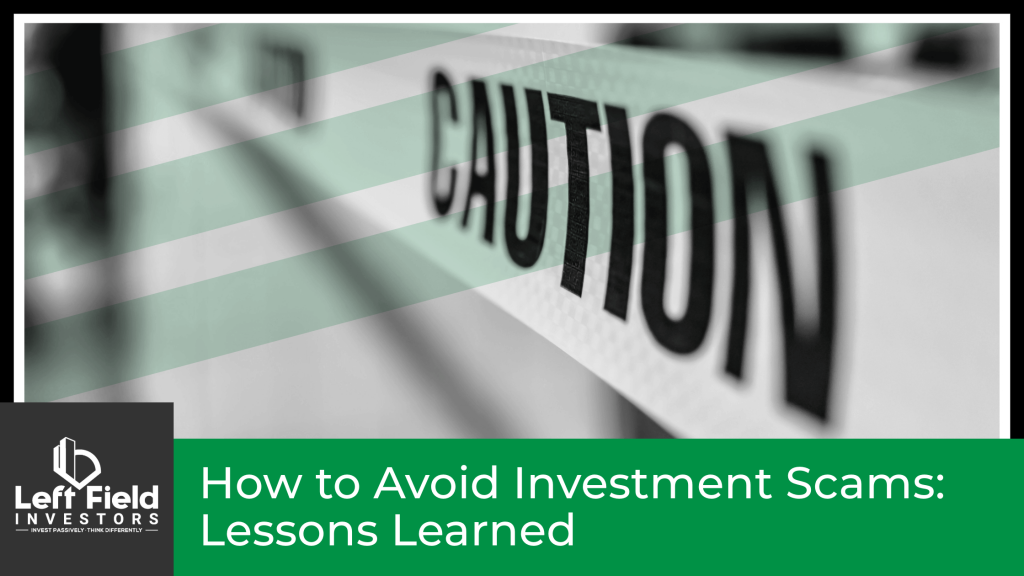*This was part of a monthly update the blog’s author, Denis Shapiro, provided for his income fund investors. Due to ongoing court matters, he tried to avoid mentioning any names, but he did provide an SEC link to the actual charges.
Before we get into the most recent SEC investigation that has made significant waves throughout our investor community, it’s important to understand that as a Limited Partner, deals like this will unfortunately happen. SIH Capital Group was a victim of what the SEC now alleges to be a Ponzi scheme in late 2019. That investment is currently in bankruptcy court, so we will refrain from making additional comments, other than to share the lessons we learned.
We mitigated the fallout from that investment by allocating only 5% of our available capital to it. In many ways, we are grateful that we went through with that investment, as it has sharpened our ability to say no to future deals.
The mark of a good investor is to constantly learn from their mistakes. The only way to do this is to not play the victim, but to clearly state the lessons learned from an investment failure. It is these lessons that will hopefully push you to say no next time a deal that sounds too good to be true comes your way.
So, let’s take a moment to restate SIH’s lessons from our failed investment:
- Avoid evergreen funds.
- Avoid guaranteed returns.
- Avoid heavily advertised firms.
- Avoid investments where you don’t have strong relationships with the operator.
- The importance of proper diversification.
- Avoid sponsors who overmarket of the tax benefits of an investment
Avoid evergreen funds
While I have not seen the Private Placement Memorandum (PPM) from the fund under investigation, I cannot comment on whether it was an evergreen fund. However, I can say that the operators behind the fund appeared to be constantly raising capital, which is a troubling sign. A capital raise should coincide with an investment made in an asset.
Avoid guaranteed returns
In terms of guaranteed returns, the fund marketed high capital returns early on in your investment, which appealed to investors. While not the same as guaranteed, returns should only flow as a result of profits from an investment. If a business is so profitable that it can return large amounts of capital that quickly, one needs to question the need to raise capital in that situation.
Avoid heavily advertised firms
Avoiding heavily advertised firms is not just about advertisement. It’s about the amount of capital raisers involved in the project. It’s concerning when you start seeing the same investment appear with multiple capital raisers. In reality, only general partners (GPs) should be raising capital for an investment, unless there is a broker or dealer involved. In a way, Ponzi schemes become like quicksand and your original investor base can’t support the perpetual nature of the scheme. This is when you start seeing a growing list of capital raisers enter the picture. Also, just because an investment is advertised on your favorite podcast, doesn’t replace doing your homework on the operator. This specific fund in question was heavily featured on a very well-respected podcast. At the end of the day, that may have lowered the guard for new investors to do their homework.
Avoid investments where you don’t have a sound relationship with the operator
The number one reason why we quickly passed on this recent fund is that we had no relationship with the operator. Even though it’s number four on our list, it might as well be number one on how important it is to get to know your operator. It takes time to build those relationships and not all operators genuinely want to get to know their investors. As an investor, you are going to have to make a very personal decision of whether you want to invest on reputation or based off your relationship. Ideally, you can have both but unfortunately that is not always the case. A fun and somewhat scary exercise to perform is to list out all your investments, label one column relationships and one column reputation. Based off a 1-10 score where 1 is the lowest and 10 is the highest, score your overall portfolio. You may be surprised what you learn about your portfolio.
Importance of the right diversification
While it’s important to diversify, it’s also important to understand when you’re investing in something that is over your head. I was speaking to a fellow investor on this specific fund who turned out to work in the oil and gas space. He was incredibly surprised when talking to some of these capital raisers associated with the fund. When he discussed basic science principles that were relevant to the business model, the raisers had no clue what he was talking about. The investor jokingly referred to the raisers as not having a third-grade school level of science, but that obviously didn’t stop the capital raiser from trying to raise capital for the project.
Overmarketing of the tax benefits of an investment
The last lesson I wanted to incorporate is the overmarketing of the tax benefits of an investment. I see this all the time! It’s important to optimize your taxes, but I feel we need to take a step back, especially with investments that promise offsetting active losses or tax-free versus tax deferred. Investing in hard assets like real estate already comes with some incredible tax benefits due to depreciation, but there are things like depreciation recapture that aren’t talked about nearly enough. You should be investing because you like and understand the asset, not to avoid taxes.
Conclusion
You may or may not agree with all these rules, but I hope that reading these over may help you pause and objectively think through some of these red flags because while it’s easy to invest in a bad deal, it’s almost impossible to get out of one.
Bio: Denis began investing in real estate in 2012, when the market was just beginning to recover from the global financial crisis. He went on to build a cash flowing portfolio that includes many alternative assets, such as note and ATM funds, mobile home parks, life insurance policies, tech start-ups, industrial property, short-term rentals, and more. He also co-founded an investment club for accredited investors in 2019. Leveraging these successes and the lessons learned throughout his career, Denis launched SIH Capital Group.
Denis’ book, The Alternative Investment Almanac: Expert Insights on Building Personal Wealth in Non-Traditional Ways, is based on his personal experiences, supplemented by interviews with some of the best alternative asset investors in the business today.
.








